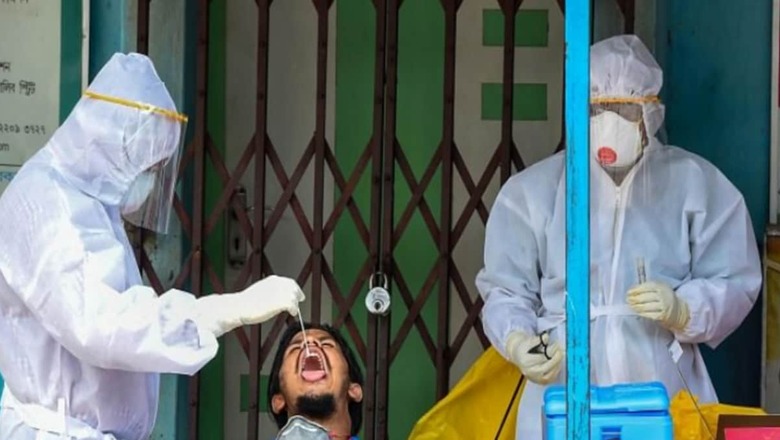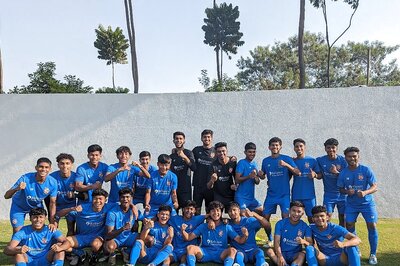
views
Kerala’s aggressive Covid-19 testing and detection are the main reasons why the state consistently finds itself at the top of the list each time there’s a surge in cases, say epidemiologists and doctors News18 spoke to. According to the union ministry of health and family welfare, the southern state has seen a rush of 292 cases (as of December 20), taking the total positive count to 2,041 with three deaths.
Kerala replicates the Covid-19 situation globally, rather than how the rest of India reacts, said Dr Anish TS, who was part of the state’s task force to handle the pandemic. Whenever Europe, Singapore, the Netherlands, the US, etc, are affected by Covid, so does Kerala, he said. “The rest of India has a different picture, especially when it comes to the spread of the virus. The pattern of Kerala is slightly different from the rest of India because the testing patterns, detection being more rigorous, and population density also contribute to the virus lingering longer,” Dr Anish told News18. “One should understand that the spread of the virus in Kerala is also much slower compared to other states despite the dense population.”
Around the first Covid wave in 2020, the World Health Organization (WHO) praised Kerala’s efforts to control the pandemic. “The leadership helmed a robust response to the novel coronavirus disease very early, following the news of outbreak in China in January 2020. As the state registered India’s first COVID-19 case on 30 January 2020, the Government declared a health emergency in the state, after two more cases were confirmed on February 2 and 3, 2020. The initial response focused on surveillance and screening of all incoming passengers from China and others who had come in close contact with these travelers,” the WHO said in a report. “As on 30 June 2020, Kerala had sent 1,71,846 samples for testing. In addition, more than 46,689 samples were taken from high-risk groups like healthcare workers as part of the sentinel surveillance carried out in all 14 districts in the state to check the prevalence of a disease in a community or population. Further, 1193 samples have been tested from three districts, Ernakulam, Thrissur and Palakkad by ICMR in Kerala as part of ICMR Sero-surveillance study. True NAAT and CB NAAT (Xpert-SARS-CoV testing) has been initiated in eight government institutions and nine private institutions for testing samples for patients undergoing an emergency surgery, symptomatic health workers, sick patients or COVID suspected death.”
At that time, the increasing spread of Covid in the Gulf countries had also become a major cause of concern in Kerala, which has a sizeable section of its population working there, a lot of them ordinary workers and labourers. In a letter to Prime Minister Narendra Modi, chief minister Pinarayi Vijayan had then pointed out that nearly one million of the total 2.8 million Indians in the UAE were from Kerala.
On the matter of the deaths that took place in Kerala, Dr Anish also pointed out that almost all except one were those who were above the age of 60 years and had severe comorbidities. He called it a major concern in Kerala, where the state’s elderly population is almost double the national average.
“We haven’t had a census conducted since 2011. According to that census, Kerala’s elderly population was around 15 per cent compared to the national average, which was around 8 to 9 per cent. If a population census is conducted now, we would possibly find Kerala’s aged comprising close to 20 per cent, almost double compared to the national average at maybe 10 to 13 per cent,” the doctor said.
When Covid-19 strikes, it affects Kerala’s aged community, especially those who are above the age of 65 years, he said. “The pattern of age structure is something that contributes to Covid-19 mortality numbers,” Dr Anish told News18. “Of the 13 deaths reported, 12 were above the age of 65 with severe comorbidities. If this variant (JN.1) is allowed to transfer like this, then it is our elders who are at risk.”
According to a source in the Kerala health department, the state saw a slight increase in respiratory and influenza-like illness (ILI)-related cases in November.
“We sent samples for genome sequencing and testing in November and one of them has come positive for the JN.1 strain, the results of which we received in December. More tests are being done after we noticed the slight increase in respiratory infections and many were found to be mildly symptomatic. Some of the variants that were tested were found circulating in Kerala and other parts of India as well,” the official said.
Kerala’s health minister Veena George attributed the number of positive cases being reported to the state’s “excellent and robust health system”. “Things are detected early and correctly and should not be misinterpreted as the spread of the disease and should not affect people’s lives. We, however, do advise the elderly and seriously ill people to take precautions like wearing masks to prevent Covid-19,” the minister added.
“15 people went to Singapore from India in the past months where the JN.1 variant already existed. It means that this coronavirus variant is also present in other states of India. It is unique that it was found through testing in Kerala and this was discovered due to our solid detection and vigilance system,” minister George had said when the first set of cases was detected in the state.
Another senior doctor who is part of the advisory group for the state added that people from Kerala travel across the world. The doctor, who did not want to be named, also spoke of how the JN.1 strain was first detected in the US in September 2023, and by the end of October, it had spread across Europe and several countries in Southeast Asia, including Singapore.
Dr Sulphi Nuhu, who is also the Kerala IMA state president, pointed out that the state, apart from rigorous testing and detection, also sends samples for mutation checks regularly.
“There is no sudden increase in Covid-19 cases in Kerala. The cases that are being reported are very mild, but one should remain cautious and keep a close watch on any symptoms that may aggravate,” the doctor warned.
After the festive season of Dussehra and Diwali, doctors have also found an upward tick in respiratory cases, coupled with the number of travellers who go in and out of Kerala for the holidays.
Dr NM Arun, another Palakkad-based Covid expert, added that one expects an increase in respiratory issues after Diwali and the months of November and December.
“There has been no major upward tick as there has been more and more sequence testing. There is expected to be an upward tick with Christmas and New Year celebrations as many people will interact with each other as part of celebrations,” the doctor said.



















Comments
0 comment